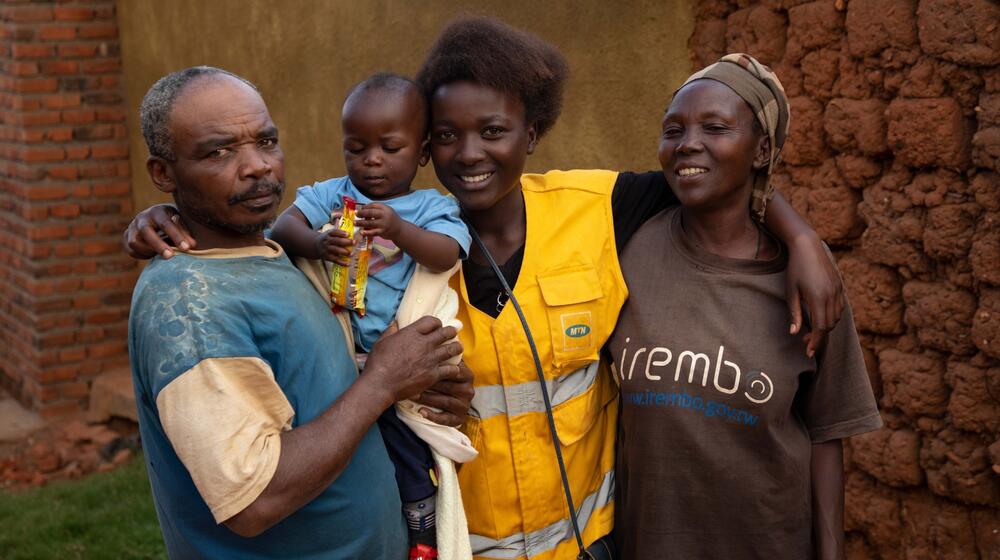News
After an adolescent pregnancy drove them apart, here’s how one family in Rwanda reconnected
- 02 November 2022
News
KARONGI, Rwanda – When Nyiranzavugimana Florence was 19 years old, she fell unexpectedly pregnant. Initially, family and friends reacted by shunning her – subjecting Ms. Nyiranzavugimana to the shame, isolation and stigma that too often accompanies unplanned teenage pregnancies.
Stereotypes of unmarried, irresponsible girls with “loose morals” often dominate society’s vision of unintended pregnancy. But the truth is that every woman is at risk, with gender inequality, sexual violence, lack of access to sexual and reproductive health care, and poverty driving the issue.
The result, according to UNFPA’s 2022 State of World Population Report, is that nearly half of all pregnancies each year are unplanned. Meanwhile, the global adolescent birth rate for 2020 was 41 births per 1,000 young women aged 15-19.
“The staggering number of unintended pregnancies represents a global failure to uphold women and girls’ basic human rights,” said UNFPA Executive Director Dr. Natalia Kanem in a statement launching the report. “For the women affected, the most life-altering reproductive choice – whether or not to become pregnant – is no choice at all.”
Reconnecting through communication
Despite the prevalence of both unplanned and adolescent pregnancies, society often greets teenage mothers with judgment and ostracism.
In Rwanda, where a recent health survey shows 5 per cent of women and girls aged 15-19 have begun childbearing, young, unmarried mothers are sometimes viewed as having lost agaciro – meaning value – and typically leave school. Additionally, financial hardship can accompany the struggle to balance employment with the responsibilities of child-rearing.
Ms. Nyiranzavugimana is among those that left school after she became pregnant. And once her parents found out about the pregnancy, they became so angry and disappointed that they kicked her out of the family home. She received no assistance from them until an opportunity to reconnect and regain their support arose in the form of a UNFPA-backed parent-adolescent communication forum.
These forums, conducted by the Imbuto Foundation with support from the Korea International Cooperation Agency (KOICA) and UNFPA, help first-time adolescent mothers and their parents communicate through challenges and build young women’s safety nets. Meetings cover how to provide teenage mothers better support, options for sustainable income, and the prevention of potential future unintended pregnancies or gender-based violence.
“My takeaway from the training was that what happened to us should not put an end to our dreams,” Ms. Nyiranzavugimana said. “I reunited with my parents and continued to attend regular meetings with them.”
Standing tall

On a sunny Wednesday morning in June 2022, Ms. Nyiranzavugimana heads to work in Karongi with her two-year-old son in tow. From her usual spot under a yellow umbrella, Ms. Nyiranzavugimana runs her small business providing mobile money services – a source of both income and pride for her and her family.
“I’m earning a little money to feed my lovely boy. I am glad that with this job I am able to take care of myself, my child and even my parents,” she added.
Ms. Nyiranzavugimana was able to start her business by saving money from a transportation stipend provided by the Imbuto Foundation and some help from her parents. After beginning by selling bananas and avocados, Ms. Nyiranzavugimana’s dreams, research and drive directed her towards mobile money services. Today, she is an agent of a telecommunication company and no longer relies on her parents or others for income, able to provide for her own and her child’s needs.
Walking tall and feeling more confident, Ms. Nyiranzavugimana’s empowerment also extends to her new perspective on sexual and reproductive health.
She is proud of her ability to exercise bodily autonomy and make informed choices when it comes to sex, her reproductive health and her future. “I can choose what to do and when to do it,” she said.